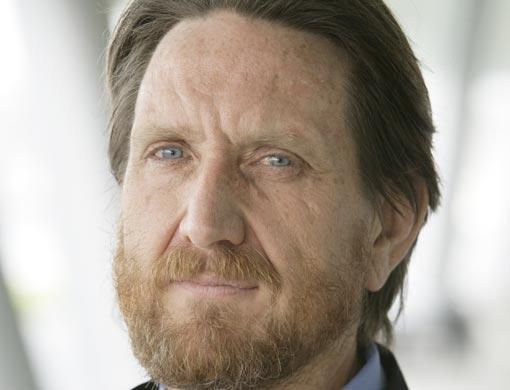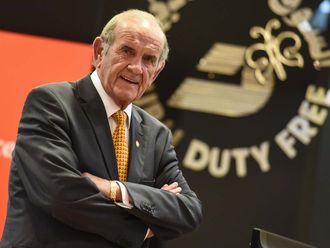For a person who helps organisations 'transform' into ideal employers that foster ideal employees, Etsko Schuitema seems, at first sight, a stern and unyielding person.
But first impressions are mostly never bang-on, and so it proved in Etsko's case – despite not having been informed of an interview by his publicist, and despite having to forego a sound check for his talk at the two-day conference 'Empowering People – Building the Nation'.
His Care and Growth Leadership Model is much in demand in the labour market. I got the answer to my first impression of Etsko being a stern person the moment he started explaining his model.
"You know, when a person is honest, he cannot always be nice." Point taken. But then growing up in Joburg, South Africa in the early 1960s was a challenging time for Etsko. His father was a miner, and this exposed him to the inner workings of the mining industry at a young age. This also set him on his path in life, leading him to the Care and Growth Model that many industry leaders swear by today. And when he explains it, you realise this is the only way organisation can expect to grow in future.
"The Care and Growth Model is about constantly understanding the conditions under which people become committed to organisations," he says simply in his mellifluous baritone.
"There are two reasons why employees go to work: one is because they have to, and the other is because they want to. Now if you ask anybody who goes to work because they want to, they'll give a whole list of reasons: their boss is approachable, they take a genuine interest in them as a person; they're honest, give constructive feedback…eventually you get the sense that so many things are being repeated."
Two employee themes
Etsko has honed it down to two basic themes. "There is a theme that has a soft ring about it, which is 'personally supportive', 'they listen to me' and so on. And the word that we think works best with that soft theme is 'care'. Because the issue with this theme is it's got a definite unconditional feel associated with it. If you are supportive of your subordinates, for example, and if your boss wants to do something unjust to that person, you'll support that subordinate, which means you've got to put your own interests on the line.
That's what the soft theme requires: a genuine interest, and not just to get something out. The harder theme is something like honesty or fairness. You know if a person is always honest, he is not always going to be nice. Sometimes he may have to say something that may be upsetting at times.
The question is, why do you need it? "If a man does not tell me where I stand, how am I going to learn or grow?" asks Etsko.
"So the hard theme has to do with growth. Which means if you work for somebody because you want to, basically it's not because the person does 500 things for you; they only do two things for you: they care for you unconditionally, and give you an opportunity to grow. These are the two themes of opportunity for everybody on this planet."
A universal application
According to Etsko, these two tactics are not culture-specific. "I've done this in all sorts of contexts. I've done this in Europe, in Africa, in India, in Pakistan, wherever you go and you ask the people who's the boss they would like to work for they say these two things." The key issue is: why is it so universal?
"To explore that you need to examine the nature of the question," explains Etsko. "If you work for somebody because you want to, and that person asks you to do something, you'd probably do it. Which means you give the person the right to ask you to do things or exercise power over you."
When you look at it from that point of view the universality of it makes sense. "Because the first people to exercise power over you were your parents, and in that relationship there are two people," elaborates Etsko. "There are the parents and the child; a superordinate and a subordinate.
The job of the big one is very specific to the little one: it is caring. In any relationship of power where the subordinate experiences that – where the superordinate is paying that coin of caring – the subordinate becomes willing. If the subordinate feels you're not paying that coin, then he becomes resistant.
It doesn't matter how much you're paying, you could be paying four times what you're paying now, but he comes to you because he has to, not because he wants to. So, that's where the model came from. It's called the Care and Growth model because it is about understanding the core criteria for legitimacy here, what actually gives you the right to be in charge of people."
Developed in South Africa
There is an interesting story about how he came to develop the Care and Growth model. Etsko grew up in South Africa with his Dutch immigrant parents. "My father was a miner. He mined for 42 years and did the blasting himself.
He used to say, 'A man's got to do a man's job'. By the time he retired he was a wreck; he was blind in one eye, legs were almost gone... all from mining accidents. I think that's what aroused the curiosity in me about the world of men, and the violence of men. We moved to Johannesburg in the early '60s and lived in a white, working class environment.
Because my father had silicosis (lung disease) as a result of mining, I received a grant from the Chamber of Mines to study, and that's where the whole adventure started."
After an honours degree in social anthropology, he was employed as a graduate researcher with The Chamber of Mines of South Africa's Research Organisation in the late '70s.
He was specifically employed by the Human Resources Laboratory of the Research Organisation. These were times of upheaval in South Africa, and his work was initially focused on the issue of conflict in gold mines during the final stages of the overthrow of the apartheid regime.
Due to his position, he was right in the middle of the conflict that swept through the mines. His groundbreaking work dealing with conflict resolution was noted, specifically his development of a framework for understanding and trust in this controversial industry.
The accidental anthropologist
"Some of the breaks in our lives are usually by accident," reflects Etsko. "I studied social anthropology with this naive view that I wanted to go to the jungles in South America and study the tribes and so on. That was how naive I was! Then I was employed by the Chamber of Mines in South Africa, which at that stage had a very large research organisation looking at environmental control, work mechanics and basically how workers behave under great stress, as they were working 4,000 metres down in the mines.
There was a small group in this operation that I joined, which was studying human conflict in the mines, and ways of dealing with it. I joined them out of a sense of curiosity, but it became incredibly inspirational, eight years of having this lab of 500,000 people trying to kill each other.
It was the most wonderful opportunity to see what works and what doesn't to keep people reasonably contented with their establishment. A great opportunity for a young man."
An understatement. But then Etsko is understatement personified. This led to the development of the Care and Growth Leadership Model that provided a framework
for management to be able to consistently adhere to the criteria which created a foundation for a more positive work environment.
The application of the model met with significant success, which led him and a small group of colleagues to form an organisation, Schuitema Associates. This made a wider dissemination of the model possible.
Think of a sports coach
Etsko likes to use a metaphor of a coach in team sports to illustrate his point. "In a team sport the coach is like the leader, and you have a game that is played for a result," he explains.
"If the coach was to view that it was his job to produce the result and he is going to use the players as the resources to do that, they'd probably poison him because it's not his job. It's the players' job to produce the result.
That doesn't mean the coach doesn't have a job. But it is a different job. His job is to care for the players. His deliverable is a change in the player. And only where the leadership of enterprises have understood that their real deliverable to posterity is the excellence of the people working for them, will you find a fundamental change in the nature of the enterprise."
But Etsko doesn't find his success limited because of this stand. "There is an understanding that models that have served humanity for the last 200 years, which basically have been brazenly based on self-interest, are no longer functioning," he says.
"And this is not just an understanding by one or two 'crazy academics', there is a growing wave throughout the world saying we cannot continue pillaging like we are."
This is obviously something Etsko is very passionate about. "There are seven and a half billion of us in the planet, in the next 15 years there will be nine billion. This is not a limitless cake. The old rules of pillage and loot, you know, reduce everything to resources that we can consume, is
no longer functional. Look what's happening with the food crisis, fuel, minerals, in fact, all resources. It's
not sustainable.
"I think there is a very real realisation that this brand of doing business and this brand of running society based on brazen self-interest is no longer sustainable, and if we don't change our agenda we won't have the planet within a generation –
it's that serious.
Now, increasingly, people are beginning to realise that.
It has found different expressions, and one of them is the growing environmental lobby in the world. These are no longer the views of a few bleeding hearts or 'crazies'. As much as anything else, if former American Vice President Al Gore were to run for President today, he would win."
This has translated to more employers interested in using Etsko's leadership model. "When I started this business in the early '90s, it was a real challenge, a battle to get anybody interested," he ruminates. "But increasingly there is a real sense of curiosity about an alternative, and really there aren't too many alternatives at the moment that have been fully thought through.
You do have some sense of alternatives in a more benign enterprise leadership model that's beginning to develop, but a lot of these are based on a 'feel-good' factors, they are not researched.
They don't have a real base.












